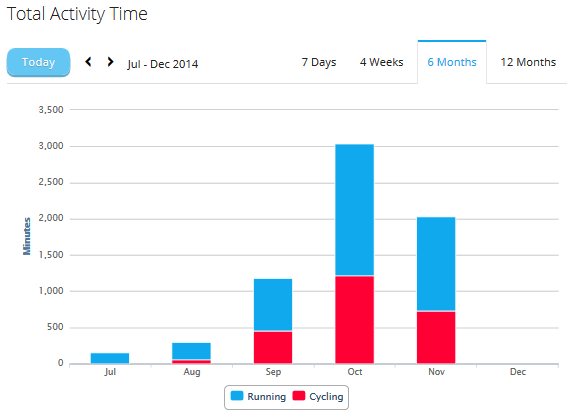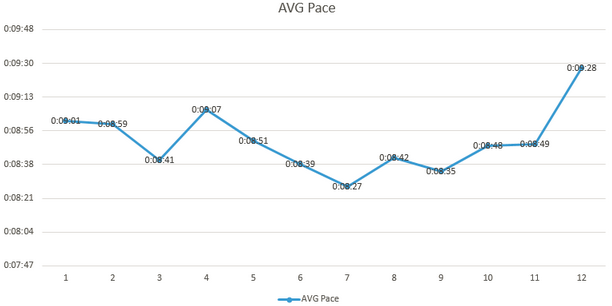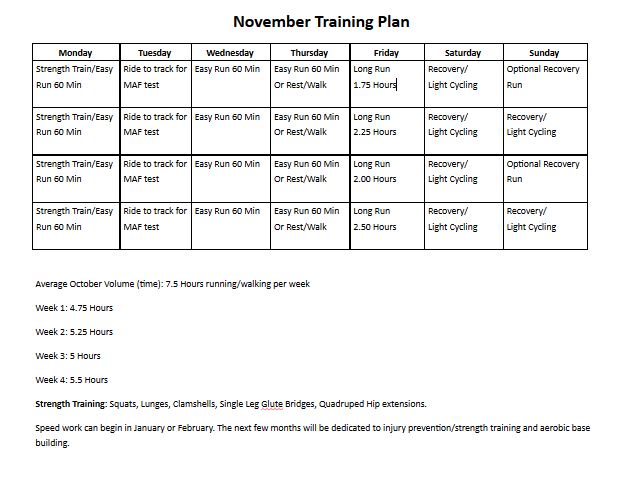11/29/2014
My MAF Test progress has come to a halt over the last few weeks. While this drop in pace may be a product of the freezing Chicago temperatures, there is one major part of my training that might need improvement; my diet.
The Maffetone Method is a holistic approach to endurance training. Paying attention to your stress, diet, and fitness throughout training is the supposed key to making this ship float. My training has been more focused and intentional than ever. My stress levels are equivalent to laying in a hammock with crossed legs and a book about buddhism. But my diet could have some room for improvement.
Here is a basic summary of my diet in the recent past. The crossed out items will have to be removed and or replaced from my diet for the next two weeks.
breakfast
* eggs
*
ketchup* cheese
*
coffee w/ added sugar or creamer*
milk* kale
*
oatmeal w/ added sugar*
raisins* vegetable oil
lunch
*
2 x peanut butter and jelly sandwich*
more coffeedinner
*
rice*
beans* onions
* eggs
* kale
* carrots
* fry ’em up
I think most of you would agree I can improve. Maffetone suggests a two-week test, to reset your body into a fat burning mode. This premise is accomplished basically by giving your body much less carbohydrates to use as fuel. http://www.philmaffetone.com/2-week-test
This is vain but I’m going to quote my last post, “A study contained in this post called Effects of Ultra-Endurance Exercise and Carbohydrate Restriction on Membrane Fatty Acids, Inflammation, and Insulin Sensitivity suggests that a period of 4 weeks is required to adapt to a newly acquired diet. And in this case, athletes changing to a no carb diet returned to their performance level after 4 weeks of a new diet BUT used about 90% of fat for fuel versus the 50% they used to. ”
Maybe this is just the reset my body needs to start burning fat and improve my aerobic fitness. If not, at least I will know that it’s not my diet that is slowing my progress. And along with the aforementioned post, I’m hoping to be able to continue this diet to meet that 4 week criteria, to allow my body to more completely adapt.
I plan to follow his modified two week diet, which allows low glycemic carbs. ie. my beans and rice. I’m a cheap ass hole and these are necessary staples in my kitchen, though I will limit them only as part of recovery meals.
In Maffetone’s book, he boasts about an athlete who improved their MAF time by 25 seconds in just two weeks by switching diet. I would be really encouraged to see that sort of progress in my MAF time. This type of increase adjusted for my ability could potentially mean a 1 minute increase in my 5k and a 10 minute increase in my marathon time.
But that’s not it; I have been some trouble with insomnia. A few nights a week, I will lay in bed for longer than an hour trying to fall asleep, thinking about running, ketchup, or pop-tarts. Maffetone suggests that this might be the product of a bad diet. For this reason alone, I’m willing to give the two week test a try. Every moment wasted trying to fall asleep, COULD BE SPENT MAFFIN.
For anyone who doesn’t know me personally but read this whole thing, you’re weird. This blog is really becoming more of a training diary that’s unnecessarily public.
Day 1 11/29/14 – Ran 14 miles, my longest run in over a year. Felt good to get to the half marathon distance but there was definitely a lack of energy/motivation that hit around 1 hour, 6 miles in or so. I think there’s a good chance this has to do with having no carbs before the run. I tried to eat a lot afterwards, after burning 1400 calories but still feel slightly hungry at 11pm writing this. I’m also trying not to eat after 8pm on this diet, to see if my sleep improves. Here is todays 3 mile maf test with 1 mile warm up.
Mile 1 9:05 148bpm
Mile 2 9:32 148bpm
Mile 3 9:47 149bpm
Total 28:24 09:28 min/mile
Day 2 11/30/2014 – After writing in this journal last night, I realized my recent slowing in MAF tests is probably not due to cold weather, diet, or wind. It was myself being over trained. I am sticking to the 2 week test but dramatically reducing my training volume. I plan on only doing a maf test later this week to see if there’s any improvement from my extra recovery time. Otherwise, no running. I’ve read that trouble sleeping can also be due to overtraining. At 30 miles a week, I thought I was getting enough rest.
I feel good on the second day of the two week test. I have been eating a lot to keep up on the calories but I’ve read about people being hungry. I’ve been feeling generally satisfied. I SLEPT WELL LAST NIGHT. I don’t know if I should attribute it to the 2 and half hours of running or the change in diet. Maybe both but I really hope it’s the diet.
Day 6 12/4/2014
Ran 3 miles today. Not faster or lighter at MAF but that’s not necessarily expected. I passed a BIG BM today. Cleaned out the reserves and the reserves reserves. If I had a scale there would have been some weight loss. BTW, I stepped on 5 scales at the thrift store yesterday and there was a range between the 150’s to 180’s. There was one scale that put me at 170, which seemed reasonable. I am confident that if when I go home to NJ, and the scale reads in the 160’s that I lost weight while on this two week test.
Now it’s 12/26/2014. I have undergone the two week test but did not continue for 4 weeks because of Christmas Carbs.
Here is my MAF test from 11/29/2014
Mile 1 9:05 148bpm
Mile 2 9:32 148bpm
Mile 3 9:47 149bpm
Total 28:24 09:28 min/mile
and this is my MAF test from 12/13/2014
Mile 1 8:31 151bpm
Mile 2 8:55 150bpm
Mile 3 9:15 151bpm
Total 26:41 08:54 min/mile
While I did have some rice before my second MAF test, it appears that my regression has corrected after 2 weeks of recovery and better diet. Just by feel, I don’t think the diet made much of a difference in performance. I attribute the performance correction much more to the recovery time. I might have lost some weight during the 2 week test but no more than maybe five pounds. And anyway, I have since probably put it back on from Christmas Carb Loading.
I am feeling confident that I’m set up nicely to start progressing again. I am stepping my running down to three days a week and more gradually working up the mileage. This will allow for more recovery time and also put me back to the routine I had in September, when progress was at it’s best.
Back in NJ for a Appalachian Trail run with JD, my ultra hero. Gonna be great.
Merry Christmas ya Jabroni.



